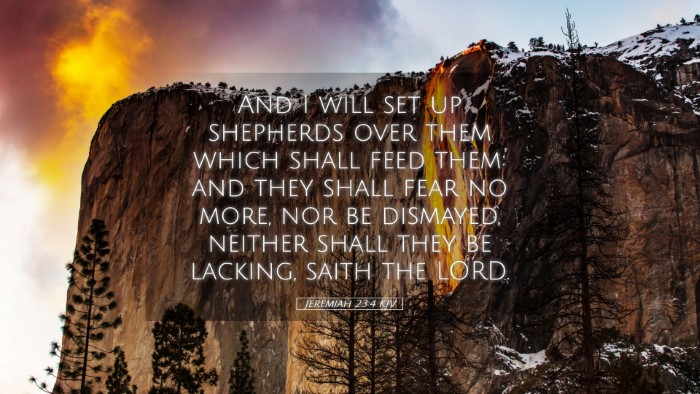Jeremiah 23:4 - Commentary and Insights
Jeremiah 23:4 states: "And I will set up shepherds over them which shall feed them: and they shall fear no more, nor be dismayed, neither shall they be lacking, saith the LORD." This verse is a part of a larger prophecy concerning the restoration of God's people and the establishment of righteous leadership. The implications of this verse are profound for understanding God’s intentions for His people.
Contextual Background
This verse is situated within a section of Jeremiah that speaks to the failures of Israel's leaders and the hope for future restoration. It emerges against the backdrop of false prophets and corrupt leaders who have led the nation astray. Understanding the historical context is critical for discerning the full weight of God’s promise in this verse.
Divine Promise of Shepherds
The promise of God to “set up shepherds over them” signifies His care and provision for His people. Shepherds, in the Biblical context, signify leaders who guide, protect, and nurture their flock. This can be seen in the pastoral imagery prevalent throughout scripture.
- Matthew Henry's Commentary: Henry emphasizes that true shepherds will lead their flock towards spiritual nourishment. He underlines the importance of God's initiative in appointing these shepherds and reflects on the role of the church leaders today in feeding their congregations with sound doctrine.
- Albert Barnes' Notes: Barnes interprets “shepherds” as divinely appointed individuals who will be characterized by their unwavering commitment to their responsibilities. He points out that these shepherds will alleviate the fears of the people, restoring their confidence in God's protection and guiding them away from despair.
- Adam Clarke's Commentary: Clarke further elaborates that these shepherds will be instrumental in ensuring that the people are equipped to face the future confidently. He notes that the assurance given—“they shall fear no more, nor be dismayed”—creates a sense of hope and restoration that is foundational for a covenant relationship with God.
Theological Implications
Theologically, this verse speaks to the heart of God's covenantal relationship with His people. It highlights several critical themes:
- Leadership and Responsibility: There is an intrinsic connection between divine leadership and the well-being of the people. Pastoral responsibility, as represented by the shepherd, encompasses teaching, protecting, and guiding. The implications for modern-day church leaders hinge upon the recognition of their role as God's appointed shepherds.
- Hope and Restoration: The promise of no longer being dismayed indicates a pivotal shift from judgment to restoration. This reflects God's unchanging faithfulness despite human shortcomings. It emphasizes the merciful nature of God, particularly in restoring His people.
- Security in God’s Provision: This verse reassures believers of God’s provision and support. It articulates that in following God's appointed leaders, His followers will find tranquility. This leads to an essential aspect of faith—trusting in God's sovereign provision through His chosen instruments.
Practical Applications for Today
For pastors, students, theologians, and Bible scholars, the implications of this verse extend beyond theology into practical ministry:
- Encouragement for Leaders: This verse serves as a reminder to church leaders about the weight of their calling. Leaders are called to feed their congregations with both truth and grace, fostering an environment where members feel safe and encouraged.
- Addressing Fear and Dismay: Understanding that God promises protection through leadership can help address the contemporary fears faced within congregations. Pastors can foster community and support, ensuring members are not left in isolation during troubling times.
- Importance of Sound Doctrine: This highlights the necessity for leaders to be well-versed in scripture and the sound doctrine, feeding the flock with wisdom and knowledge that draws them closer to God.
Conclusion
Jeremiah 23:4 encapsulates a powerful promise of God’s care for His people through the lens of effective leadership. As evident in the thoughts of Matthew Henry, Albert Barnes, and Adam Clarke, this verse calls to mind the critical role of shepherding in the life of the church. It invites examination of both the responsibilities placed upon leaders and the trust believers can place in God’s provision.
As we reflect on this verse, let us recognize the divine intention behind God’s promise: to provide for, protect, and restore His people through faithful shepherds who are committed to leading them in truth and love.


